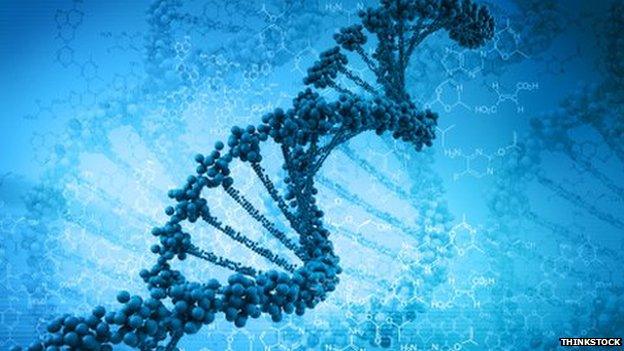'Screen more' for cancer risk genes
- Published

More people in high risk groups should have their DNA tested for breast cancer risk genes, a cancer charity says.
Mutations in BRCA genes can give women up to an 80% chance of developing breast cancer.
A trial involving 1,034 Ashkenazi Jews, who are at high risk, suggested more than half of their cases were not being picked up under the current NHS guidelines.
The Eve Appeal charity said wider testing would save lives and money.
Mutations in BRCA genes stop DNA repairing itself and increase the risk of cancer developing.
As well as breast cancer, they are also linked to ovarian and prostate cancers.
More likely
Around one in 800 people carry a BRCA mutation. But in the Ashkenazi Jewish population the figure reaches one in 40.
The research team, based at University College London and the University of Manchester, compared the effectiveness of screening all Ashkenazi Jews with just screening those who were identified as being at risk because of their family history.
They showed that 56% of those carrying a mutation would not have had a test for BRCA based on family history alone.
The findings, published in the Journal of the National Cancer Institute, show extra screening could save lives and money.
Can more cases of cancer be prevented?
There are an estimated 114,400 Ashkenazi Jewish women in the UK.
A separate analysis showed screening all of them over the age of 30 would lead to "a reduction in ovarian cancer and breast cancer by 276 and 508 cases, respectively, at a discounted cost savings of Ā£3.7m."
Prof Ian Jacobs, one of the researchers at the University of Manchester, said: "For the Ashkenazi Jewish community specifically, this suggests that population testing for BRCA1/2 mutations could save lives."
He told the “óĻó“«Ć½: "This can save lives and money, why wouldn't the NHS want to do something that could achieve both objectives.
"But the NHS does need to do its own proper evaluation."
The cost of this kind of screening, both for BRCA and other risk genes, is plummeting.
The NHS will eventually have to deal with questions about screening the whole population.
"No-one is suggesting we test the entire UK population for BRCA right now," Prof Ian Jacobs told the “óĻó“«Ć½.
He added: "Broadly I think we need to do a lot more research on the consequences, good and bad, of this sort of testing in broader populations.
The costs of course would be much higher because the prevalence of the mutations is much lower."
Athena Lamnisos, from The Eve Appeal which funded the trial, said: "Women at increased risk of cancer deserve far more than today's genetic screening process gives them.
"This study shows that broadening genetic testing beyond just family history saves more lives and more money."
- Published14 July 2011
- Published1 June 2014
- Published19 September 2014